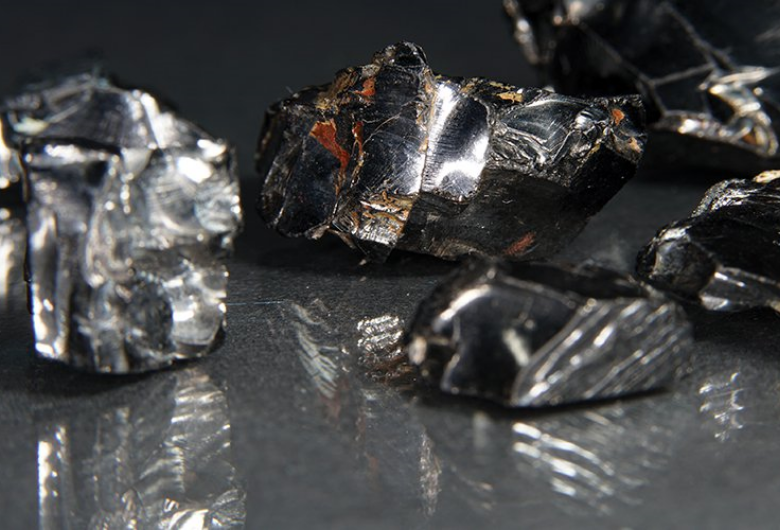The United States needs a secure supply of critical minerals to protect its national security.
Minerals like cobalt, gallium and rare earths are vital elements in superalloys, semiconductors and permanent magnets. These components, in turn, are essential for advanced technologies such as jet engines, quantum computing and military radars.
In short, critical minerals form the foundation of America’s digital economy and modern military.
However, the United States relies heavily on critical mineral supply chains controlled by China. For example, according to the U.S. Geological Survey, the United States produces zero percent of the world’s refined cobalt while China produces 72 percent; the United States produces zero percent of the world’s gallium while China produces 98 percent; and the United States produces zero percent of the world’s refined rare earths while China produces 85 percent. The list continues.
The United States lacks a secure supply of critical minerals, relying dangerously on its top geopolitical adversary. The government, so far, has pursued piecemeal actions that have insufficiently incentivized domestic mining and refining of critical minerals. Moving forward, the government needs a comprehensive industrial policy that allows U.S. companies to maximally mine the nation’s critical minerals and make America domestically self-sufficient in refining critical minerals.
“Industrial policy” refers to “policies that stimulate specific economic activities and promote structural change,” as defined by Harvard economics professor Dani Rodrik in his article “Industrial Policy: Don’t Ask Why, Ask How.”
The White House has indeed tried to grow U.S. capacity for mining and refining critical minerals. The effort began most vigorously in the previous administration when President Donald Trump invoked the Defense Production Act to make purchases and purchase commitments for samarium cobalt magnets.
Trump then signed Executive Order 13953, which ordered agencies to bolster domestic mining and refining capacity, as well as accelerate federal permitting for critical mineral projects.
Most notably, the Trump administration’s Department of Energy issued a rule making critical mineral projects eligible for the Advanced Technology Vehicle Manufacturing Direct Loan Program and Title XVII Innovative Energy (Section 1703) Loan Guarantee Program. This updated rule unlocked substantial loans for domestic critical mineral projects. Currently, the vehicle manufacturing program has $55.1 billion available in loan authority, and the Title XVII program has $42.5 billion available in loan authority.
The Biden administration continued efforts by invoking the Defense Production Act to make purchases and purchase commitments of minerals necessary in large-capacity batteries. The invocation specifically targets domestic production of cobalt, lithium, manganese, nickel and graphite.
Additionally, the State Department established the Minerals Security Partnership: 10 U.S.-aligned countries seeking to mobilize investment in critical mineral supply chains, including production in resource-rich developing countries.
Congress has taken steps as well. For instance, the Infrastructure Investment and Jobs Act appropriated $7 billion for battery supply chains, including critical mineral production. Most recently, the Inflation Reduction Act included a 30 percent tax credit for investments in battery material projects and a 10 percent tax credit for critical mineral production costs. Furthermore, Congress has sought to incentivize domestic critical mineral projects through the annual National Defense Authorization Act.
The above efforts will surely bolster some parts of the critical mineral supply chain. Yet, the United States will remain dependent on China unless the U.S. government adopts an industrial policy for critical minerals. The White House and Congress should take the following actions to increase domestic mining and refining of critical minerals.
First, the White House should withdraw federal public lands for critical mineral exploration. Public lands often include mineral-rich areas like national parks, forests and wilderness areas. For example, the Idaho Cobalt Belt crosses the Salmon-Challis National Forest and Frank Church: River of No Return Wilderness. Federal lands, however, have mining regulations that prolong the permitting timeline and expose mineral leases to bureaucratic cancellation.
To expedite permitting, the White House should withdraw public lands to survey for critical minerals and then award government contracts to private entities for mining in these areas. This action has precedent. In the 1950s, the secretary of the interior withdrew public lands for government surveying of uranium deposits, and then the Atomic Energy Commission awarded mining contracts to private entities. The result was domestic uranium production increasing dramatically, according to the U.S. Energy Information Administration. Today, the White House should do the same for critical minerals.
Second, the White House should reinterpret loan statutes, making domestic critical mineral projects eligible for more programs. For instance, the International Development Finance Corp., which has a $60 billion lending cap, does not invest in domestic projects. However, it should have domestic investment authority because projects like domestic refineries will help catalyze mine production in resource-rich developing countries, effectuating its mission of overseas economic development.
Notably, the White House expanded the corporation’s domestic authority by having the agency run a domestic loan program via the Defense Production Act during the coronavirus pandemic.
The White House should also reinterpret statutes to allow loans for U.S.-led mining projects in countries like the Democratic Republic of the Congo. As justification, overseas mining projects should be eligible for Department of Transportation loans because more mines are necessary to reach U.S. adoption targets of clean energy vehicles.
The International Development Finance Corp. should also prioritize overseas mining projects because mines are often located in countries needing economic development.
Third, the White House should make purchase commitments for U.S.-mined and refined critical minerals. Purchase commitments — like those authorized by Biden’s Defense Production Act invocation — will support domestic mines and refineries by guaranteeing a large-scale buyer, which private entities value in volatile mineral markets. Again, this action has precedent. During the Cold War, government purchase commitments for cobalt spurred cobalt mining and refining in Idaho. Today, purchase commitments for critical minerals would similarly incentivize domestic production.
The White House can make purchase commitments via several funds. For example, the Defense Department can direct a portion of the $448 million in the National Defense Stockpile Transaction Fund and $914 million in the Defense Production Act Fund toward critical mineral purchases. Such purchases would help replenish and grow the National Defense Stockpile. Therefore, purchase commitments would both spur domestic production of critical minerals and bolster critical mineral reserves in the National Defense Stockpile.
As for Congress, it should first implement expedited deadlines for federal permitting of critical mineral projects. According to analysts SNL Metals and Mining, U.S. mine permitting takes seven to 10 years. This timeline dissuades many companies from building critical mineral projects, like mines, because the companies must invest significant capital and then wait years before receiving returns on those investments.
Congress specifically needs to reduce the permitting timeline for mining on federal lands. Section 40206 of the Infrastructure Investment and Jobs Act requires the Bureau of Land Management and the Forest Service to report on the average timeline for each permitting step. After receiving this report, Congress should pass a bill requiring the relevant agencies to comply with expedited deadlines for each step. Such deadlines will reduce the regulatory risk for mining investors.
Next, Congress should allocate grants and loans to critical mineral projects. These projects face not only significant upfront capital costs but also limited private financing due to regulatory and supply chain risks. Congress can alleviate these financial burdens with grants and loans.
For grants, Congress should authorize and appropriate specific Defense Production Act funds for critical mineral projects. For loans, Congress should provide more authority to the Energy Department and specify a percentage of those loans for critical mineral projects.
Congress can also allocate grants and loans for critical mineral projects by reallocating unused pandemic relief funds or specifying uses for general funds.
For instance, Rep. Byron Donalds, R-Fla., introduced the “Cobalt Optimizes Batteries and Leading Technologies Act,” which authorizes $800 million from already appropriated funds for the acquisition of domestically refined cobalt for the National Defense Stockpile. Congress can use this bill as a template to target other already appropriated funds and other critical minerals.
Congress should offer tax credits and deductions for domestic critical mineral projects. Tax credits should include production tax credits based on a company producing certain amounts of critical minerals, and investment tax credits based on a company investing in critical mineral projects. These incentives would most benefit established companies since they are already producing minerals and likely have capital to invest.
Notably, the Inflation Reduction Act included a clean vehicle credit, featuring two tax credits totaling $7,500 for clean vehicles with a percentage of critical minerals from the United States or free trade partner and battery components assembled in North America. Consequently, electric vehicle companies like Tesla are seeking to domestically source their critical minerals and battery components to access these tax credits. Congress should include similar domestic content requirements for critical minerals in future electric vehicles and renewable energy tax legislation.
While the government has long implemented industrial policy, some people may question whether the recommended actions will increase domestic production of critical minerals.
As noted above, the U.S. government has previously taken most of these actions to good effect. Moreover, in an article entitled “Industrial Policy and Competition,” a National Bureau of Economic Research team found that “industrial policies — subsidies or tax holidays — that are allocated to competitive sectors … or allocated in such a way as to preserve or increase competition, have a more positive and significant impact on productivity or productivity growth.”
Others may note the risk for fraud, waste and abuse in the recommended actions. Such concerns are valid. Yet, these risks accompany any government program, including existing subsidies for airlines, agriculture and defense. Therefore, the government must diligently vet companies and projects receiving government funds and release funds in an incremental process — versus all at once — as project goals are met.
People may also argue that the recommended actions do not sufficiently constitute a comprehensive industrial policy. They are correct. The above actions are solely initial actions that the government should take to increase domestic mining and refining of critical minerals. Other actions include import tariffs on refined critical minerals, bans on foreign companies mining on federal lands and domestic content requirements — not preferences —for government purchases of critical minerals.
In conclusion, robust critical mineral supplies are vital to national security, especially America’s high-tech economy and advanced military. Yet, the United States depends heavily on critical mineral supplies controlled by China. The United States should maximally mine its domestic critical minerals and become domestically self-sufficient in refining critical minerals.
Source: National Defense
Useful Links

